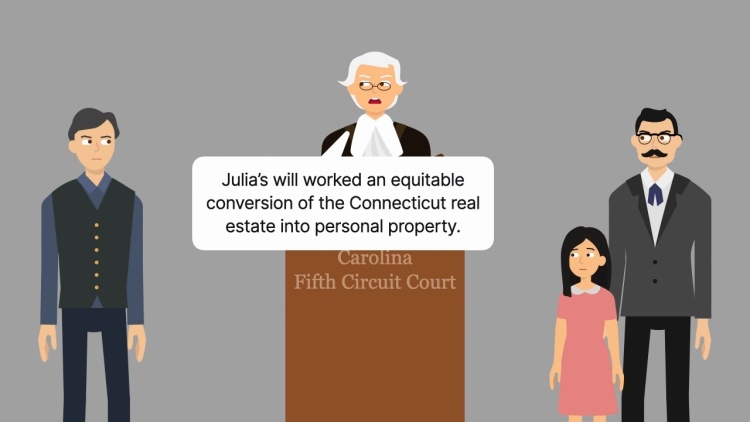Clarke v. Clarke
United States Supreme Court
178 U.S. 186 (1900)

- Written by Denise McGimsey, JD
Facts
Mrs. Clarke, upon her death, bequeathed Connecticut real property in equal shares to her husband and her daughters, Julia and Nancy (defendant). All were residents of South Carolina. Julia died a short while after Mrs. Clarke. Acting as executor for Mrs. Clarke’s estate and as trustee for Nancy, Mr. Clarke (plaintiff) sought a construction of Mrs. Clarke’s will in a South Carolina court. A guardian ad litem was appointed to represent Nancy. The court ruled that Mrs. Clarke’s real property, wherever located, was equitably converted into personalty and could be sold. Mr. Clarke then applied to a Connecticut court for instructions in disposing of Julia’s share of the Connecticut property. Pursuant to Connecticut law, the Connecticut court held that there was no equitable conversion of the Connecticut real estate and that Julia’s entire share should be awarded to Nancy. Under South Carolina law, on the other hand, Julia’s share would have been divided equally between Nancy and Mr. Clarke. Mr. Clarke petitioned the United States Supreme Court for certiorari.
Rule of Law
Issue
Holding and Reasoning (White, J.)
What to do next…
Here's why 907,000 law students have relied on our case briefs:
- Written by law professors and practitioners, not other law students. 47,100 briefs, keyed to 996 casebooks. Top-notch customer support.
- The right amount of information, includes the facts, issues, rule of law, holding and reasoning, and any concurrences and dissents.
- Access in your classes, works on your mobile and tablet. Massive library of related video lessons and high quality multiple-choice questions.
- Easy to use, uniform format for every case brief. Written in plain English, not in legalese. Our briefs summarize and simplify; they don’t just repeat the court’s language.





